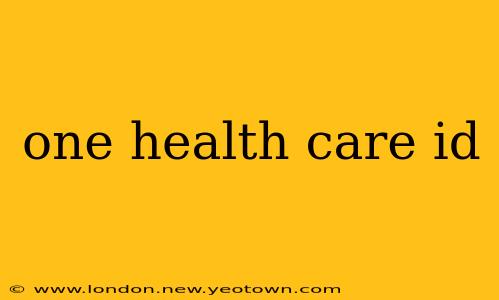Imagine a world where accessing your medical records is as easy as checking your bank balance. No more frantic searches through overflowing file cabinets or confusing phone calls to different providers. That's the promise of a single, unified healthcare ID. But what exactly is a one healthcare ID, and how does it work? Let's dive into the details.
The concept of a "one healthcare ID" isn't a single, universally adopted system. Instead, it represents a growing movement towards streamlining healthcare data access through various initiatives and technologies. The ultimate goal is to create a system where you have a single, secure identifier that links all your health information across different providers, hospitals, and pharmacies. Think of it as a digital key to your complete medical history.
What are the benefits of a single healthcare ID?
A unified healthcare ID offers numerous benefits for patients and healthcare providers alike. Imagine the ease of:
-
Improved Coordination of Care: Doctors and specialists have instant access to your complete medical history, reducing the risk of medication errors, duplicated tests, and conflicting treatments. This is particularly crucial for patients with complex health conditions.
-
Reduced Administrative Burden: No more filling out endless forms and repeating your medical history at every appointment. The streamlining process saves you time and reduces administrative costs for the healthcare system.
-
Enhanced Patient Safety: A single, easily accessible record reduces the likelihood of mistakes and improves the overall safety and quality of care.
-
Empowered Patients: You have more control over your health information and can easily share it with the providers of your choice. This puts you in the driver's seat, promoting better communication and informed decision-making.
-
Streamlined Research and Public Health Initiatives: Aggregated, anonymized data from a unified system can contribute to better public health research and disease prevention strategies.
How does a one healthcare ID system work (in theory)?
While the exact implementation varies, the core principle involves a secure digital platform where your health information is stored and accessed using your unique identifier. This platform would likely utilize advanced security protocols to protect your privacy. Your ID would be linked to your medical records from various sources through secure, interoperable systems. The process would ideally be:
-
Registration: You register with the system, providing necessary information to establish your unique ID.
-
Data Consolidation: Your health data from different providers is securely linked to your ID.
-
Secure Access: You and authorized healthcare providers can access your records through a secure portal.
-
Data Control: You have the ability to control who can access your information and what information is shared.
What are the challenges in implementing a one healthcare ID system?
Creating a nationwide, unified system isn't without its hurdles:
-
Interoperability: Different healthcare systems use different technologies and data formats, making it challenging to integrate them seamlessly.
-
Data Privacy and Security: Protecting sensitive medical information is paramount. Robust security measures are essential to prevent breaches and unauthorized access.
-
Cost and Infrastructure: Implementing and maintaining a nationwide system requires significant investment in technology and infrastructure.
-
Regulatory Compliance: Navigating complex regulations related to data privacy, security, and interoperability is crucial.
What are some current initiatives towards a one healthcare ID?
Several initiatives at both the state and federal levels are working towards better health data interoperability and improved patient access to records. These initiatives often focus on building secure health information exchanges and promoting the use of standardized data formats. However, a truly unified, nationwide system remains a work in progress.
Will my insurance information be included in a one healthcare ID?
While the exact inclusion of insurance information would depend on the specific implementation of a one healthcare ID system, it's likely that such systems would integrate information relevant to your healthcare coverage. This could simplify billing and claims processing.
Are there any privacy concerns associated with a one healthcare ID?
Privacy is a major concern with any system that centralizes sensitive personal information. Strict regulations and robust security measures are critical to mitigate these risks. Ideally, a one healthcare ID system would adhere to stringent privacy standards and provide patients with granular control over their data.
The journey towards a streamlined, unified healthcare ID is ongoing. While challenges remain, the potential benefits for patients and the healthcare system are significant. As technology advances and initiatives progress, we can anticipate a future where accessing and managing your health information is simpler, safer, and more efficient.

